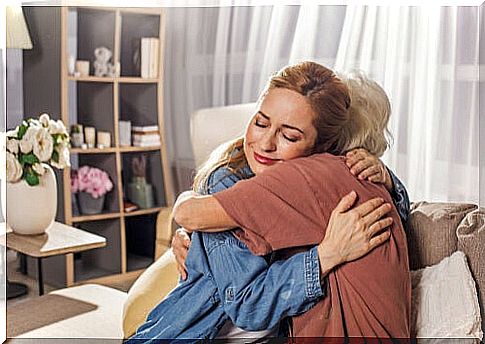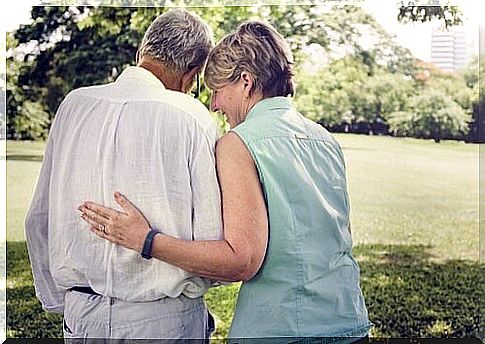I Take Care Of You And Let Myself Be Taken Care Of

We need to learn very different roles and forget others throughout our existence. For this reason, the roles of caring are fundamental in this learning. This movement and transformation of roles is what allows us to adapt to the new situations of our changing reality.
Sometimes, we have to learn the role of being cared for when we suddenly fall ill or simply run out of strength. However, at other times, life requires us to learn to play the role of caregiver when we become parents or have someone who needs us.
There are times when people spend so much time in one of these roles that we have a hard time getting out of it. Life and our body ask us to change roles, but, due to injuries related to fear, we may not be able to assume this new demand of life. In the end, we usually end up doing it, but it can hurt on the way to final acceptance.

The role of caregiver and the role of care
The role of being cared for is usually learned at an early age. We are the most biologically immature species of animal born and that makes us particularly dependent on our main figures.
However, some children cannot be cared for at an early age, either due to abandonment or because their parents are not prepared to assume the roles related to caring. This lack and wound of abandonment can accompany us in later stages, especially when we have to assume one of these roles in the future.
We usually learn the role of caregiver when we are older when we are no longer the only custodians of care as in childhood. Sometimes we learn them when a person needs us, when we are parents or even in professions linked to the role of caring, such as those related to health or education.
As in the previous role, some children have to assume this role to take care of their siblings or even their own parents. In particular, it occurs when there are mental illnesses or traumatic situations for the parents, as in some divorces where the children assume the role of one of them. This process is known as parentification.
When we get stuck in one of the roles
As we have seen, there are situations in life that leave us with a wound of abandonment that makes it very difficult to change our role from receiving care to caregiver or vice versa. We have been in these roles for so long that simply doing otherwise makes us fearful and uncomfortable.
Historically, the figure of caregiver has fallen on women. Women have been, and many times continue to be, the full-time homemakers and caretakers of the entire family. In fact, when women have entered the world of work, the busiest professions have also been related to care, as in education and health that we mentioned before.
Assuming these gender roles and the wounds in our attachment causes many difficulties in this exchange of roles about care, causing us suffering and, at other times, learning the new roles out of obligation. Thus, you can check if you feel identified in any of these difficulties through the following situations:
- When you are sick or not feeling well, it takes a lot of effort to let them take care of you. You may even feel very guilty or that you annoy the other person.
- Your emotions usually overflow with people with whom you really feel that it is appropriate for us to do so. For example, emotional discharge with children.
- You have a hard time asking for help even in insignificant things. You have to see yourself in a very big hurry to ask for it and, sometimes, you prefer to choke rather than request it.
- You have dependent behaviors. It is difficult for you to maintain or enjoy your loneliness, you need to be around people so that you do not feel alone or you have relationships that may not make you happy for fear of that loneliness.

The need to care and be cared for
The roles surrounding caregiving are learned from our earliest childhood. In fact, assuming roles that do not touch us at this stage can create emotional wounds that make it difficult for us to assume roles of care in the future. In the same way, certain gender roles, diseases or traumatic situations can also disrupt the assumption of these roles in an appropriate way.
Sometimes we need to care and it is a complicated role. It can involve sacrifices and it can lead us to forget about our own needs. This is common in the early stages of the birth of a child or in so-called caregiver burnout.
Other times we need to be cared for and rest. It may be that our body or our mind have drastically stopped us with physical or psychological symptoms and we have been left with no alternative but to allow ourselves to be cared for.
Caring and being cared for are part of the same prism. We need to be cared to care and care to be cared for. We also need to be flexible in these roles, exchanging them with our close people when circumstances require. Thus, we will take care of others from empathy and we will allow ourselves to be cared for from our own love, since we will consider ourselves worthy of that care. Let’s not forget, caring requires empathy and being caring, self-love.









